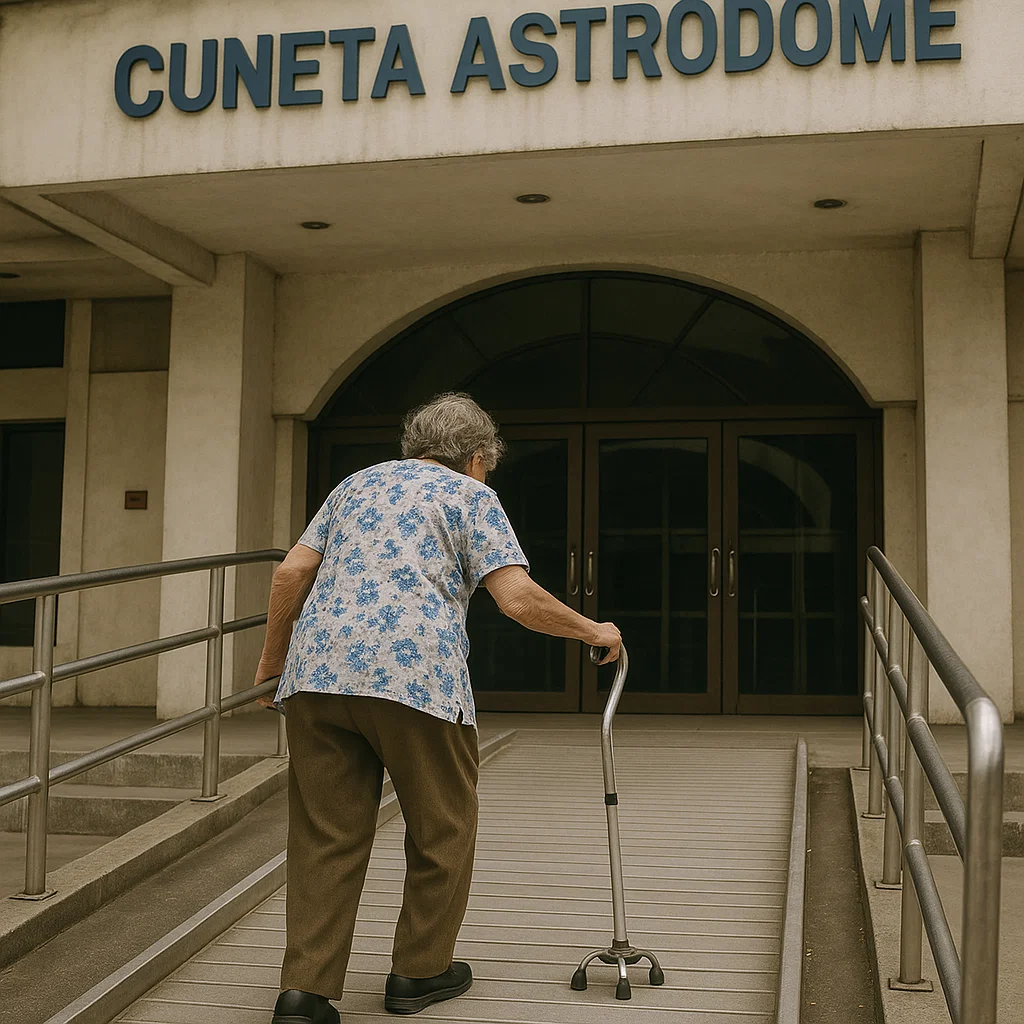The Cuneta Astrodome in Pasay City stands as a key venue for sports, entertainment, and public events in Metro Manila. As the population of senior citizens and persons with disabilities (PWDs) continues to grow, ensuring accessibility for all becomes a matter of civic responsibility and inclusive urban planning. This guide examines the venue’s accessibility, from wheelchair ramps to policies that support access for everyone.
Why Accessibility Matters for Seniors and PWDs
Accessibility is not just a feature—it’s a right. For seniors and persons with disabilities (PWDs), accessible venues like the Cuneta Astrodome enable equal participation in social, cultural, and civic activities. Inclusive infrastructure, such as wheelchair ramps and tactile paving, promotes safety, dignity, and independence. When a facility offers seamless access for everyone, it reflects a community’s commitment to equity and inclusion.
The primary entrances to the Cuneta Astrodome are designed with seniors and PWDs in mind. Wide, gently sloped wheelchair ramps accompany the main staircases, allowing effortless access for those using mobility aids. Doors are equipped with push-button automatic openers and signage includes Braille labels for the visually impaired. Clearly marked paths and directional arrows inside the venue help users navigate the space confidently and independently.
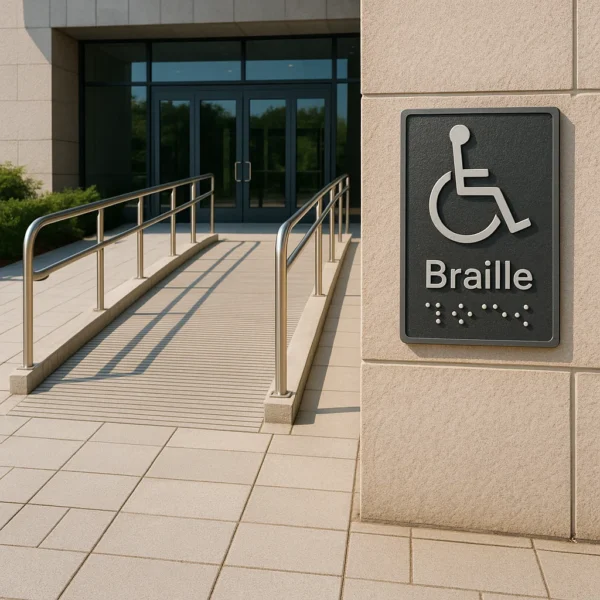
Interior Amenities and Comfort Features
Inside the Cuneta Astrodome, seating arrangements accommodate wheelchairs, ensuring PWDs can enjoy events alongside their companions. Reserved sections are located near aisles and exits for easy access. The venue provides accessible restrooms fitted with grab bars and low-mounted sinks. Waiting areas are equipped with cushioned benches and designated priority seating for seniors. These thoughtful inclusions are part of the venue’s ongoing commitment to access for everyone.
Policies and Support for PWD Visitors
The management of the Cuneta Astrodome enforces policies that prioritize accessibility. PWD ID holders are granted dedicated assistance, early entry privileges, and designated help desks during events. Staff undergo regular training to assist individuals with diverse needs. Visitors can also request on-site support ahead of their visit via the official Pasay City portal (https://www.pasay.gov.ph), ensuring inclusive planning and coordination.
Assistive Technology and On-Site Experience
To enhance accessibility further, the Cuneta Astrodome is integrating assistive technologies such as portable hearing loops for the hearing impaired and mobile app guides for indoor navigation. Some events offer live sign language interpreters, while monitors display real-time subtitles during speeches. These efforts align with global standards and mirror the initiatives seen at venues like the SM Mall of Asia Arena.
Accessible Transportation and Parking Facilities
Reaching the Cuneta Astrodome is feasible for PWDs thanks to nearby transportation hubs and thoughtful city planning. The Pasay terminal is serviced by jeepneys and UV Express vehicles that accommodate folding wheelchairs. In addition, ride-hailing apps like Grab Philippines allow passengers to request vehicles with trunk space or extra assistance. The Astrodome provides priority parking spaces for PWDs, located nearest to entrances and clearly marked. These practices follow the guidance of the Department of Transportation (DOTr).
Staff Training and Community Engagement
True inclusivity at the Cuneta Astrodome extends beyond infrastructure. Personnel are trained in basic sign language, PWD etiquette, and emergency response for vulnerable guests. Community outreach programs are also in place, inviting feedback from advocacy groups to continuously improve accessibility. Collaborative efforts with NGOs, such as the National Anti-Poverty Commission (NAPC), ensure that accessibility remains a living priority.
Legal Foundations and PWD Rights
In the Philippines, accessibility is supported by national laws such as the Magna Carta for Disabled Persons (Republic Act No. 7277), which mandates barrier-free facilities and non-discriminatory practices. Local governments and establishments like the Cuneta Astrodome are required to comply. For a deeper understanding of rights and enforcement, the National Council on Disability Affairs (NCDA) offers comprehensive information and resources.
Future Improvements and Inclusive Design Advocacy
While Cuneta Astrodome has made commendable strides, there remains room for growth. Future upgrades could include voice-command kiosks, quiet spaces for neurodivergent individuals, and digital wayfinding systems. Local design schools and civil society groups can be involved in crowd-sourced innovation. Advocating for access for everyone requires continuous community input, strong political will, and adherence to evolving accessibility benchmarks on both local and global scales.
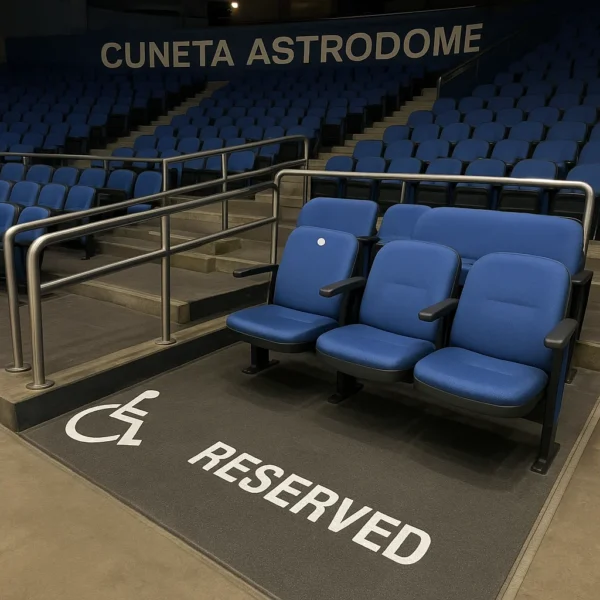
Frequently Asked Questions (FAQ)
Are wheelchairs available at Cuneta Astrodome?
Yes, the venue provides a limited number of wheelchairs on a first-come, first-served basis. It is advised to contact the management in advance to reserve one.
Is there sign language interpretation during events?
For select public events and major gatherings, sign language interpreters are provided. Attendees should check event details or inquire with the organizer ahead of time.
Can I bring a personal assistant or caregiver?
Yes, PWDs may be accompanied by a caregiver or personal assistant. Certain events may even offer complimentary passes for registered companions.
Is there priority queuing for PWDs and seniors?
Yes. Dedicated priority lanes are available at entrances, ticket booths, and concession stands to reduce waiting times for seniors and persons with disabilities.
Does Cuneta Astrodome support neurodivergent guests?
While facilities for neurodivergent individuals are limited, the venue is exploring the addition of quiet rooms and sensory-friendly areas as part of future upgrades.
Conclusion
The Cuneta Astrodome serves as a shining example of what accessible public venues in the Philippines can strive to be. By integrating wheelchair ramps, inclusive entryways, and PWD-first policies, it reinforces its commitment to access for everyone. While challenges remain, the ongoing improvements and active community engagement reflect a venue that listens and evolves. As more facilities adopt inclusive design, society takes a crucial step toward equity and dignity for all.
Real Experience: A Senior Attendee’s Perspective
Letty, a 72-year-old grandmother from Parañaque, shared her recent experience attending a church event at the Cuneta Astrodome. “I was nervous at first because I use a walker, but the entry ramps were manageable and ushers immediately assisted me,” she explained. Letty appreciated the clear signage and reserved seating, saying it made her feel welcome and included. Her story reflects how infrastructure, paired with human compassion, can break barriers for older adults.
How Cuneta Astrodome Compares with Other Metro Manila Venues
In comparison to the SM Mall of Asia Arena, the Cuneta Astrodome offers fewer digital amenities but provides more intimate, easy-to-navigate spaces—a big plus for seniors and PWDs. Unlike Araneta Coliseum, which has larger crowds and multi-level seating, Cuneta features simpler floor plans that reduce disorientation. All three venues implement accessibility features like wheelchair ramps and priority lanes, but Cuneta’s compact size gives it a unique advantage in delivering efficient access for everyone.
Understanding RA 7277 and BP 344: Accessibility in Law
Republic Act No. 7277, also known as the Magna Carta for Disabled Persons, outlines the right to access public spaces without barriers. It is complemented by Batas Pambansa Blg. 344, or the Accessibility Law, which mandates specifications for ramps, railings, doors, and floor surfaces in buildings like the Cuneta Astrodome. Compliance with these laws is not optional—it’s a legal duty. These frameworks ensure not just physical access, but also equal opportunity and dignity for PWDs in all public and commercial environments.
What to Know Before Your Visit
- Bring your PWD ID: Required to access priority services and designated seats.
- Contact ahead: For wheelchair reservations or assistance, call the Astrodome hotline in advance.
- Use Gate B: This entrance is ramp-equipped and closest to the accessible parking zone.
- Download maps: Venue layout maps with accessibility features are available online.
- Arrive early: Beat the crowds and avoid stress by arriving 30–60 minutes before your event.
Metro Manila in Numbers: PWD and Senior Demographics
According to the Philippine Statistics Authority (PSA), over 12 million Filipinos are aged 60 and above, with a significant percentage residing in urban areas like Metro Manila. Meanwhile, estimates suggest that about 1.4 million persons with disabilities live in the region, with mobility and visual impairments being the most common. These figures highlight the urgent need for accessible venues such as the Cuneta Astrodome, which serve not only as event centers but as symbols of inclusion.
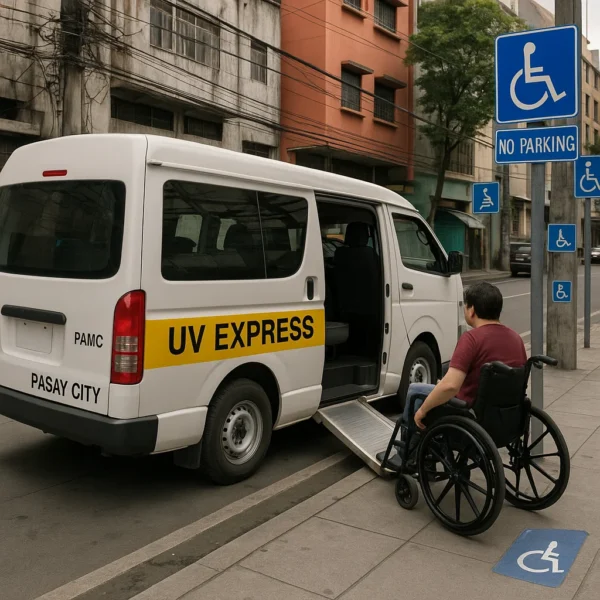
Local Advocacy and Accessibility Programs in Pasay
The Pasay City government has launched several initiatives aimed at improving accessibility. Through partnerships with disability rights groups, the city has conducted regular accessibility audits and retrofitted older structures with ramps and tactile paving. Barangay officials are encouraged to appoint PWD focal persons to address community-specific needs. These programs align with national goals and empower local stakeholders to push for lasting improvements in venues like the Cuneta Astrodome.
The Future of Inclusive Urban Spaces
Universal design goes beyond accessibility—it envisions cities that work for everyone, regardless of age or ability. The Cuneta Astrodome exemplifies this vision by integrating barrier-free paths, intuitive signage, and flexible seating. In Pasay and beyond, urban planners are beginning to embed these principles into transportation hubs, parks, and government buildings. By normalizing inclusive design from the ground up, cities can proactively support dignity, safety, and convenience for all citizens.
Top 5 Things Cuneta Astrodome Gets Right for Accessibility
- Ramp Access at Key Entry Points: Wide, non-slip ramps make it easy for wheelchair users to enter.
- Dedicated Seating: Reserved, clearly marked areas for PWDs and seniors.
- Accessible Restrooms: Fitted with grab bars and sufficient maneuvering space.
- Trained Staff: Personnel trained in basic assistance and sign language.
- Central Location: Proximity to major transport hubs with PWD-friendly options.
Common Accessibility Challenges Still Faced by Visitors
Despite improvements, some visitors report that temporary event setups may block key pathways or ramps. Others mention long queues at accessible restrooms during peak hours, and a lack of real-time digital support for visually impaired users. While staff assistance is available, there remains a need for better communication systems and wider awareness among event organizers. Recognizing and addressing these gaps is critical to fulfilling the promise of access for everyone.
How to Request Accessibility Support at Cuneta Astrodome
To ensure a smooth experience, PWDs and seniors are encouraged to coordinate with the venue at least 3 days before their visit. You can call the Cuneta Astrodome administration office via Pasay LGU or email the event organizer directly. Be sure to specify your needs—whether it’s a wheelchair, guide assistance, or reserved seating. Event staff typically confirm arrangements within 24 to 48 hours. Planning ahead helps the venue better provide access for everyone.
What Makes Accessibility Sustainable?
Accessibility is not a one-time fix—it requires consistent upkeep and user-centered evaluation. For venues like the Cuneta Astrodome, sustainability means regular maintenance of ramps and elevators, staff retraining, and transparent feedback loops. Involving PWD communities in policy reviews ensures the solutions remain practical and relevant. When accessibility is treated as a continuous process rather than a checklist item, it becomes embedded into the venue’s culture and daily operations.
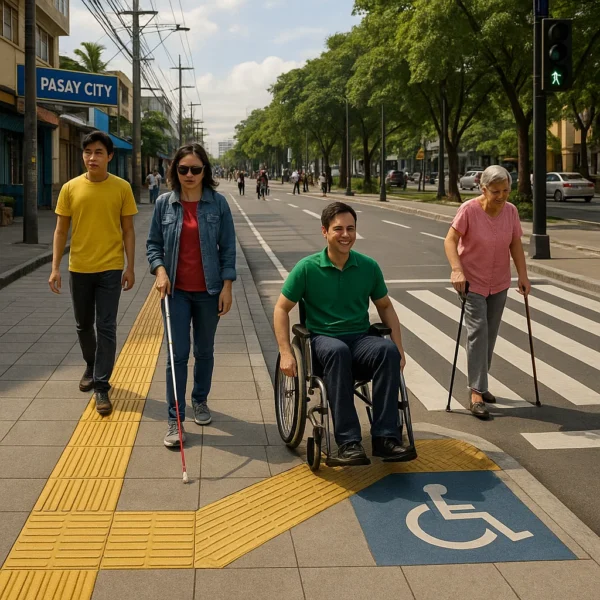
Digital Accessibility and Online Booking for PWDs
Digital accessibility is just as vital as physical access. The Cuneta Astrodome’s ticketing and event pages should ideally comply with WCAG (Web Content Accessibility Guidelines), ensuring compatibility with screen readers and keyboard-only navigation. Booking platforms can include options for selecting accessible seats, requesting assistance, or notifying organizers about medical needs. Providing PWD-friendly web experiences empowers users to plan confidently, without relying on others to interpret online systems.
Events That Prioritize Accessibility at the Astrodome
Several large-scale events held at the Cuneta Astrodome have successfully modeled accessible practices. Examples include city-wide medical missions with PWD lanes, senior-focused community fairs, and inclusive concerts with designated interpreters and wheelchair platforms. Event organizers often collaborate with Pasay’s social welfare office to meet accommodation needs. These occasions demonstrate that accessibility can be seamlessly integrated into event planning—enhancing the experience for all attendees.
A Win-Win Approach
Partnerships with PWD advocacy groups bring invaluable insights into real-world accessibility needs. By engaging organizations like AKAP-Pinoy or Tahanang Walang Hagdanan, the Cuneta Astrodome can identify overlooked pain points and co-create better solutions. These groups can also assist in conducting training sessions, audits, and user testing. Such collaborations not only build trust but ensure that changes are grounded in lived experience, not assumptions.
Accessibility Beyond Physical Space: Safety, Comfort, and Dignity
True accessibility is holistic—it’s not just about ramps or signage. At the Cuneta Astrodome, considerations such as well-lit pathways, emergency protocols inclusive of PWDs, and respectful service interactions all contribute to a dignified experience. Noise control in crowded events, adequate ventilation, and quiet zones can make the space more comfortable for neurodivergent guests and seniors alike. These “soft” aspects of design often make the biggest difference in whether a space feels truly accessible.
Letting PWD Voices Shape the Future
Feedback systems give power back to the people most affected by accessibility gaps. At Cuneta Astrodome, event organizers can install comment kiosks, anonymous digital forms, or QR-based surveys tailored for PWD visitors. Regularly reviewing this input not only reveals blind spots but also fosters trust and transparency. When guests see their suggestions reflected in real improvements—such as clearer signage or new seating layouts—they feel valued, not just accommodated.
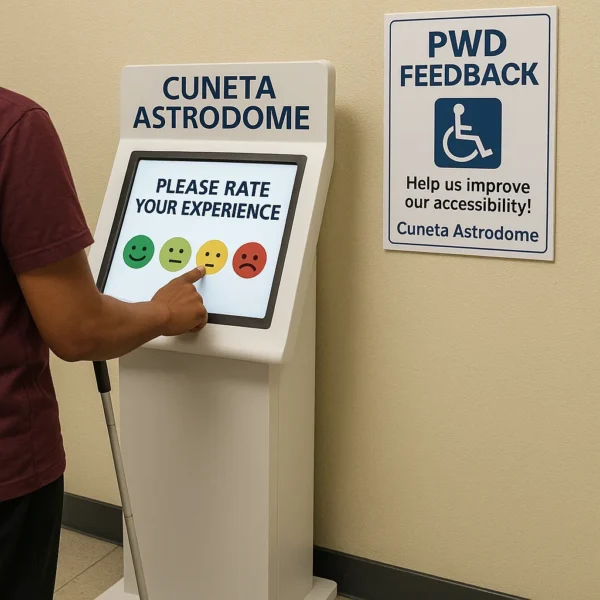
PWD Representation in Venue Planning and Events
Including PWDs in decision-making ensures accessibility efforts are grounded in lived experience. The Cuneta Astrodome and its partners can establish advisory boards with PWD members, consult community leaders during renovations, or invite PWD speakers at public forums. This moves the conversation from compliance to empowerment. Representation not only drives smarter design but also signals a cultural shift toward equity and co-creation, making accessibility truly meaningful and lasting.
Accessibility Metrics: How to Measure Success
Assessing accessibility requires more than checking off features—it demands ongoing measurement. Cuneta Astrodome and similar venues can track metrics like the number of PWD attendees, usage rates of ramps and priority lanes, feedback ratings, and incident reports. Anonymous surveys and digital analytics help identify friction points. Success is not just compliance but also user satisfaction, dignity, and repeat engagement. When accessibility becomes measurable, it becomes manageable—and ultimately, improvable.
How Cuneta Astrodome Sets a Benchmark for Other LGUs
The efforts at Cuneta Astrodome offer a roadmap for other local government units (LGUs) seeking to modernize their public venues. By combining infrastructure upgrades, policy enforcement, community collaboration, and continuous feedback, Pasay has demonstrated that meaningful accessibility is achievable—even within older facilities. As LGUs across the Philippines face similar challenges, the Cuneta Astrodome stands as a proof of concept that inclusive spaces are both possible and practical when led with intent and empathy.
Building a Truly Inclusive Future
Whether you’re a city planner, event organizer, architect, or concerned citizen, your role in shaping accessible spaces is critical. The Cuneta Astrodome shows that with the right mindset, collaboration, and continuous effort, accessibility is not a luxury—it’s a standard. Let this venue serve as both a benchmark and an inspiration. Together, we can create a Philippines where access for everyone is not just a promise, but a reality lived and felt in every public space.
- Importance of Accessibility for Seniors and PWDs: Accessible venues like the Cuneta Astrodome enable equal participation of seniors and persons with disabilities in social and civic activities, reflecting a community’s commitment to inclusion.
- Physical Accessibility Features at Cuneta Astrodome: The venue includes wide wheelchair ramps, automatic doors with Braille signage, and clear navigation paths to ensure effortless access and independence for all users.
- Policies and Support Systems for PWD Visitors: Management enforces policies such as dedicated assistance, early entry, and trained staff, with options to request support in advance through the Pasay City portal.
- Technology and Transportation Accessibility: The Astrodome integrates assistive tech like hearing loops and mobile guides, while nearby accessible transportation options and priority parking facilitate easier access for PWDs.
- Future and Community-Driven Inclusive Design: Ongoing improvements, community engagement, and law compliance highlight Cuneta Astrodome as a model for creating sustainable, inclusive urban spaces that prioritize dignity and safety.

